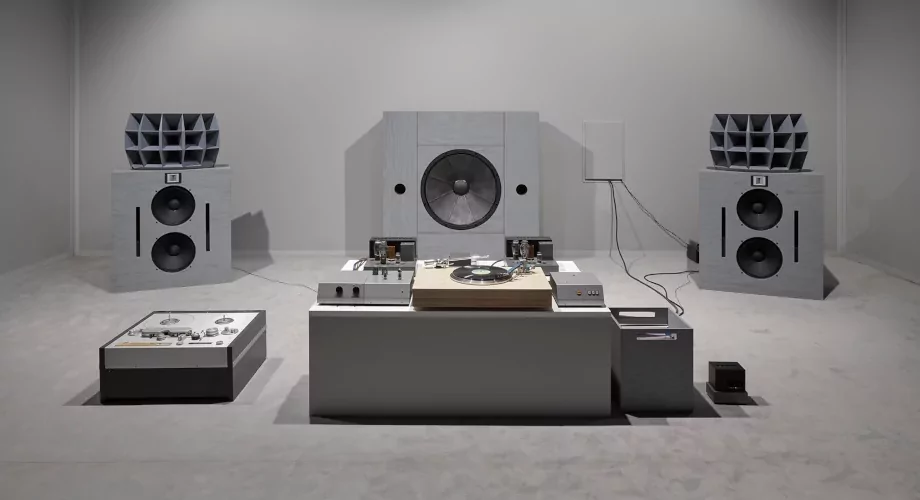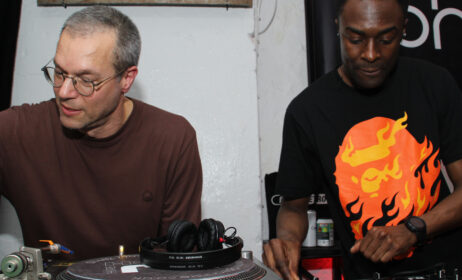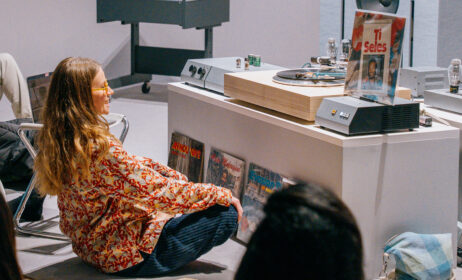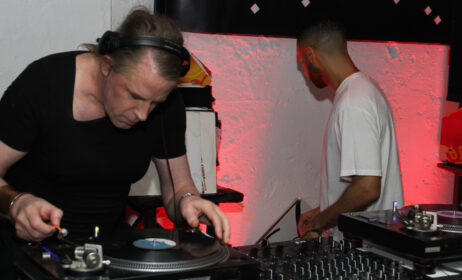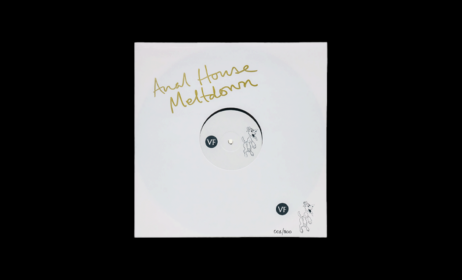Published on
August 13, 2024
Category
Features
Permanent Rotation is a series in which producers, DJs, and musicians go deep on the albums that have inspired them.
Widely known as a “DJ’s DJ,” Berlin-based CCL has turned their lack of musical training and “not knowing exactly what I’m doing” into a strength, applying intuitive techniques to “string together a bunch of different records and figure out how to make them make sense together.” Their chosen Permanent Rotation album — “I probably bought it at HMV and listened to it on my yellow Walkman,” they say — is one of the most acclaimed records of the ‘90s. Eschewing convention, it captures lightning in a bottle, an alchemical convergence of grief, chance meetings, technical naivety and one-take wonders.
CCL had a peripatetic childhood and adolescence, growing up in the US, Russia, Italy and the UK. By 16, they were living in Rome and had already visited Bristol. I wondered if it was a particularly formative trip to the city that introduced them to Tricky’s Maxinquaye.
“I’m not gonna lie, I don’t think I made the connection,” they say with characteristic candour. “I was just like, this music is cool.” The “badass” grungy album cover, showing slightly oxidised red doors, was immediately intriguing, as was the hard-to-categorise quality of the music. “It has the smokiness and sexiness of R&B and hip-hop and other things I was listening to, but it also had the grit and energy of punk and other guitar-driven genres as well,” CCL says.
The “heavy, anguished, emo” atmosphere resonated with a young CCL, even if some of the album’s themes (addiction, sex, death) went over their head at the time. It wasn’t so much a sound as an “incredibly thick”, intoxicating vibe. “It really creates a mood and a world out of so many different things,” they say. “Ideologically, that’s something I’ve wanted to do ever since.”
Around the same time they were listening to Tricky, CCL was also a fan of Portishead, but the latter has always held more appeal, specifically Maxinquaye. “It has an undeniable naivety and grit,” says CCL, noting how thrillingly precarious the album sounds, as though the whole thing could go off the rails at any moment. “Tricky didn’t know what he was doing with the sampling at all,” they say. “He even says in many interviews, ‘People think I’m trying to use weird time signatures to make my music cool, but frankly, I just don’t know what I’m doing.’”

CCL agonised over their album selection for this feature and had reservations about choosing Maxinquaye. They’re not a fan of the “background cafe music” direction trip-hop has gone in, and Tricky himself has always fiercely shunned the trip-hop label. But considering their unconventional DJing style and their very DIY, autodidactic approach to making music, it’s unsurprising they were drawn to Maxinquaye’s stretched-out samples and experimental approach. “I like to pitch things to a point that they’re unrecognizable,” they say. “The more warped and weird they are, the more they appeal to me in the way that they shouldn’t sound good, but somehow do.”
The more I read about Maxinquaye (specifically Ben Tardew’s excellent Pitchfork review), the more I could see parallels between Tricky’s philosophy and CCL’s artistic ethos, especially as described in a fantastic Art of DJing interview with Andrew Ryce.
“Music can be super academic and polished and scholarised, but [Maxinquaye] is really great in a way you could never touch if you tried,” CCL says. They don’t necessarily love every track on the album, but they can still appreciate them conceptually, and how they contribute to the record as a whole.
“Black Steel”, an innovative cover of Public Enemy’s “Black Steel in the Hour of Chaos”, is a standout track for CCL, and they indulged their “teenage self” when playing it out for the first time recently during an all night set for their subglow party. “I don’t know if anyone was into it or recognized it, but I was like, honestly, it’s just really fun to play this right now,” they laugh.
Another favourite is “Suffocated Love”, a smoky downtempo track describing a relationship powered by lust and money. “It’s very seductive,” says CCL. “I love the instrumentation and I love how they’re both singing in this duet fashion.”
“They” refers to Tricky and Martina Topley-Bird, the vocalist he infamously discovered as a teenager sitting on a wall near his home in Bristol, singing to herself. Tricky and Topley-Bird soon became lovers and would have a child together, who tragically took her own life in 2019 following a psychotic episode. The intensity of their bond is doubtless a huge part of what made Maxinquaye so magic, with Topley-Bird’s vocals notoriously recorded in one take, her melodies ingeniously improvised.
Filled with dark musings on sex, drugs and grief, Maxinquaye is named after Tricky’s mother, who committed suicide when Tricky was four. He wanted Topley-Bird’s vocals to represent “my mum speaking through me”. In some promotional images for the album, Tricky wears a wedding dress while Topley-Bird appears in a suit, their gender roles intentionally blurred as they were on the album, and in the accompanying music videos.
Shane aka Kiernan Leveaux once told CCL that this album was their gender, and it’s a concept that resonated loudly with them. “There was a very obvious gender fuckery happening through this album in a scene where that wasn’t really such a thing,” CCL says. “I think that was also really compelling to me as a teen and I think subconsciously it had an effect on me too.”
CCL describes Maxinquaye as achieving a balance of “dankess and brightness” that aligns with what they set out to do in their own work. “I always resent this feeling of having to choose between light and dark,” they say. “I love really ecstatic music, but music that pulls you in both directions feels more compelling to me, because it also feels a bit more honest emotionally.”
While their DJing style is far from conventional, CCL describes themself as a “meticulous” person and envies those, like Tricky, whose freewheeling approach yields brilliant results. “I view this way of making music as aspirational,” they say. “I would love to be this present when making music and to not care so much about the details.”
Their process might be precise and considered, but CCL shares with Maxinquaye-era Tricky a musical naivety that makes this album such a fitting source of inspiration. “Some things sound a little weird or out of tune,” they say. “They don’t sound quite right but in the context of other elements, that’s part of the charm,” they say. Listening to CCL’s imaginative recent A Night in The Skull Discotheque mix for T4T LUV NRG, I can’t help but think that Tricky would reciprocate their admiration.
CCL and Ciel’s Tilda’s Goat Stare is out now via naff recordings.

